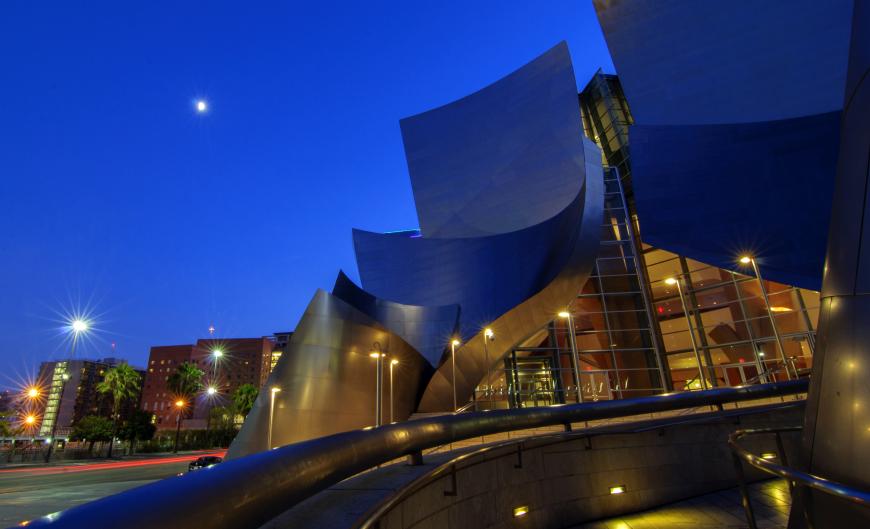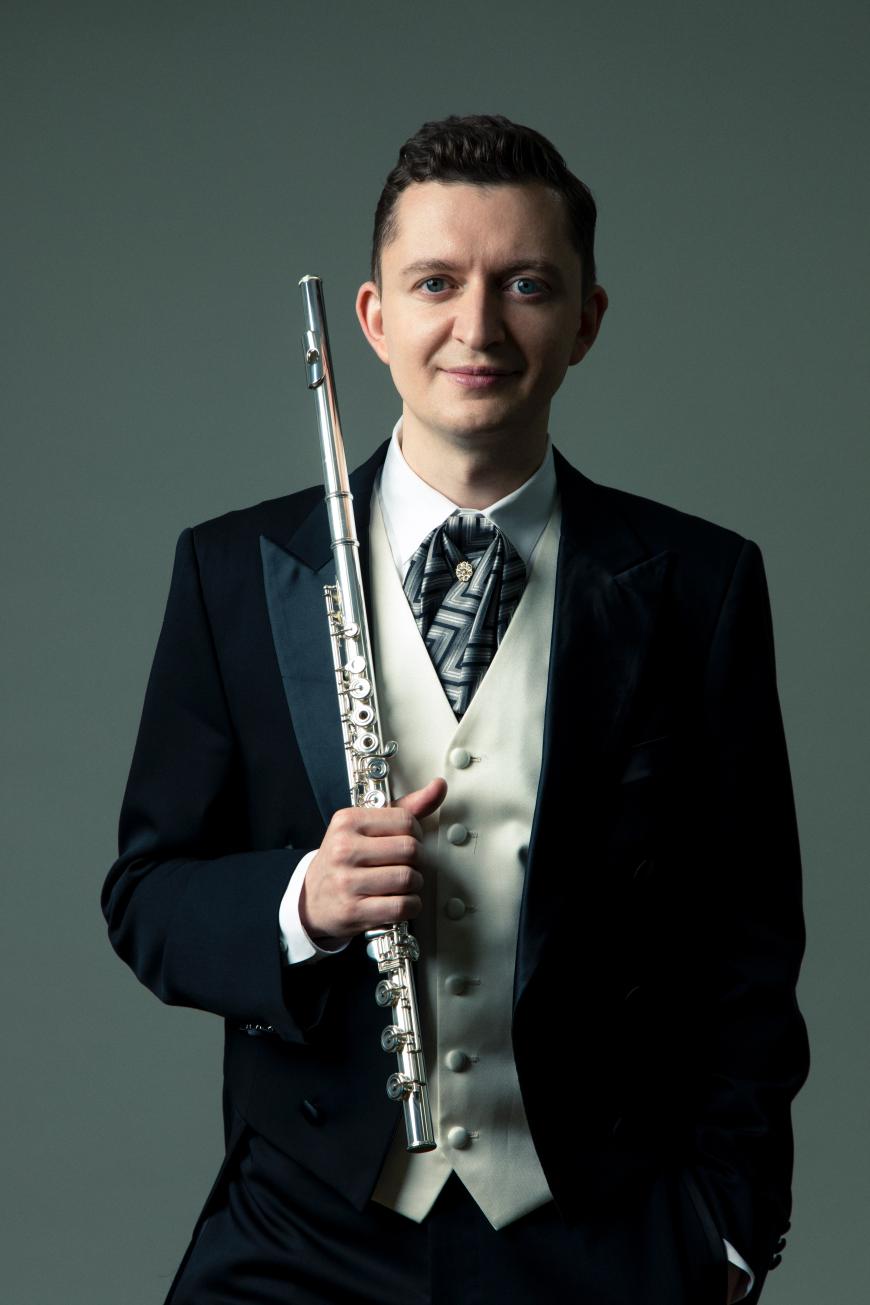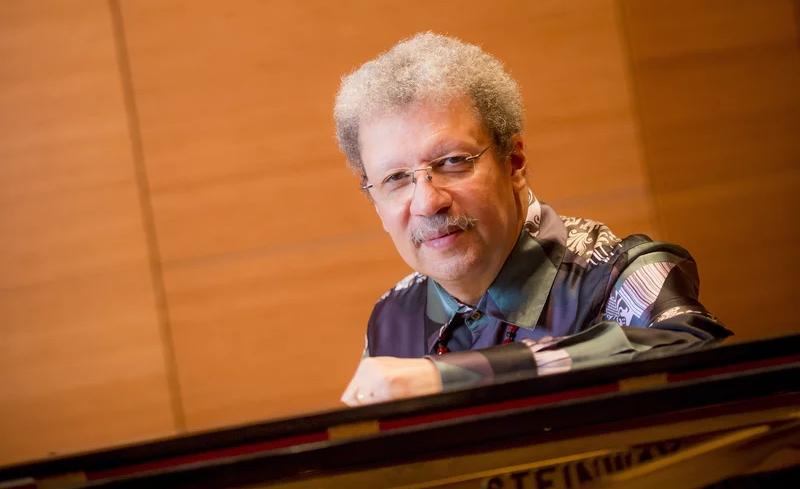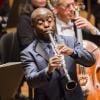
Here in a nutshell is what went on under the Green Umbrella at Walt Disney Concert Hall on Tuesday night, April 16.
There were no less than five world premieres, four of which kicked off a promising project, LA Phil Etudes, along with a fifth by Canadian-born composer Zosha Di Castri. Anthony Davis, famed for his operas X: The Life and Times of Malcolm X and The Central Park Five, was present to take in his terrific jazz-drenched clarinet concerto, You Have the Right to Remain Silent. LA Phil Creative Chair John Adams conducted.
It all went more than well. This was a consistently stimulating evening of new music, sometimes in surprising ways.
For the launch of the etudes project, four composers provided brief solo compositions for four principal players of the Los Angeles Philharmonic. Having sat through many solo pieces that were frankly little more than athletic exercises, I’m pleased to report that there wasn’t a weak moment in the set.

Anthony Cheung’s pulsate, fixate led flutist Denis Bouriakov through a playfully merry chase of extended techniques and overblowing that eventually got wildly frenetic. Dai Fujikura’s Luminous was a genuinely musical, even melodic display piece for timpanist Joseph Pereira — furiously rhythmic at first, then settling into a relatively spare conclusion. The longest of the four etudes, it exploited Pereira’s dexterity on both the mallets and the pedals that adjust the drums’ pitch in real time.
Andrew Norman’s For Chad — written as a birthday present for departed LA Phil CEO Chad Smith — made an attractive, short, and sweet moto perpetuo for first associate concertmaster Nathan Cole. Conductor (and composer) David Robertson contributed Whorls and Eddies for hornist Andrew Bain, who played this movingly melancholy piece (with apparent allusions to Benjamin Britten’s Serenade for Tenor, Horn, and Strings) high above the stage in the organ loft.
Each etude in the set hinted at the staggering amount of instrumental talent within the ranks of the LA Phil.
The title of Di Castri’s Noctiluca refers to “bioluminescent marine microorganisms that cause coastal-region waters to glow bright blue at night.” Be that as it may, the ear detected an imaginatively orchestrated tone poem for cello octet, two percussionists, piano, and accordion, a work that shimmered, slid, knocked around, and generally made a colorful showing of itself. At one point, the ensemble developed a beat that eventually turned lopsided in its complexity, only to have congas right the ship later on.
The accordion is not the most popular of instruments these days, but its purpose here was to add crunches and electronic-like touches that Di Castri meant as kind of a shout-out to the late composer Kaija Saariaho, famous for merging acoustic instruments and electronics. John Torcello’s deft playing made Di Castri’s idea pay off.
Having led Di Castri’s piece without a baton, Adams returned with one after intermission for You Have the Right to Remain Silent, which is Davis’s musical reaction to getting stopped by the police on his way to a concert, having been mistaken for a bank robber because he is Black.

The cover of the score calls it a “concerto for clarinet, Kurzweil synthesizer, and ensemble in four movements” — which barely hints at the potent 21st-century third stream fabric that Davis has stitched together. The piece is a classical composition at its core, but powered by a drum set, it also manages to get a groove going in many spots in a disarmingly natural, unforced way. Davis has been working on this kind of fusion for decades, and by the time this piece came around (the premiere was in 2007, with a revised and expanded version in 2011), he had it down.
Anthony McGill, the splendid principal clarinet of the New York Philharmonic, seems to represent Davis as he is subjected to “Interrogation” by the ensemble (first movement), contemplates “Loss” while switching to contra-alto clarinet (second movement), and faces “Incarceration” (third movement). The short finale, “Dance of the Other,” starts as a Latinized takeoff on the blues. The best and “coolest” writing comes toward the end of “Loss,” when Davis evokes deliciously suave and swinging big-band harmonies recalling Charles Mingus by way of Duke Ellington. The musicians are also asked in various spots to recite words from the Miranda rights referenced in the piece’s title.
There was plenty to enjoy in Earl Howard’s mastery of spangled, zapping, ghostly, scratchy, vibrating, often improvised processed sounds on his Kurzweil synth, cultivated solo and when going mano a mano “interrogating” McGill’s clarinet.
This performance by Adams and the LA Phil New Music Group outdid and out-swung McGill’s 2020 performance with members of the Cincinnati Symphony, available on YouTube. This piece has legs — topical ones that won’t go away anytime soon, alas, but also the enduring quality of sheer musical enjoyment.




